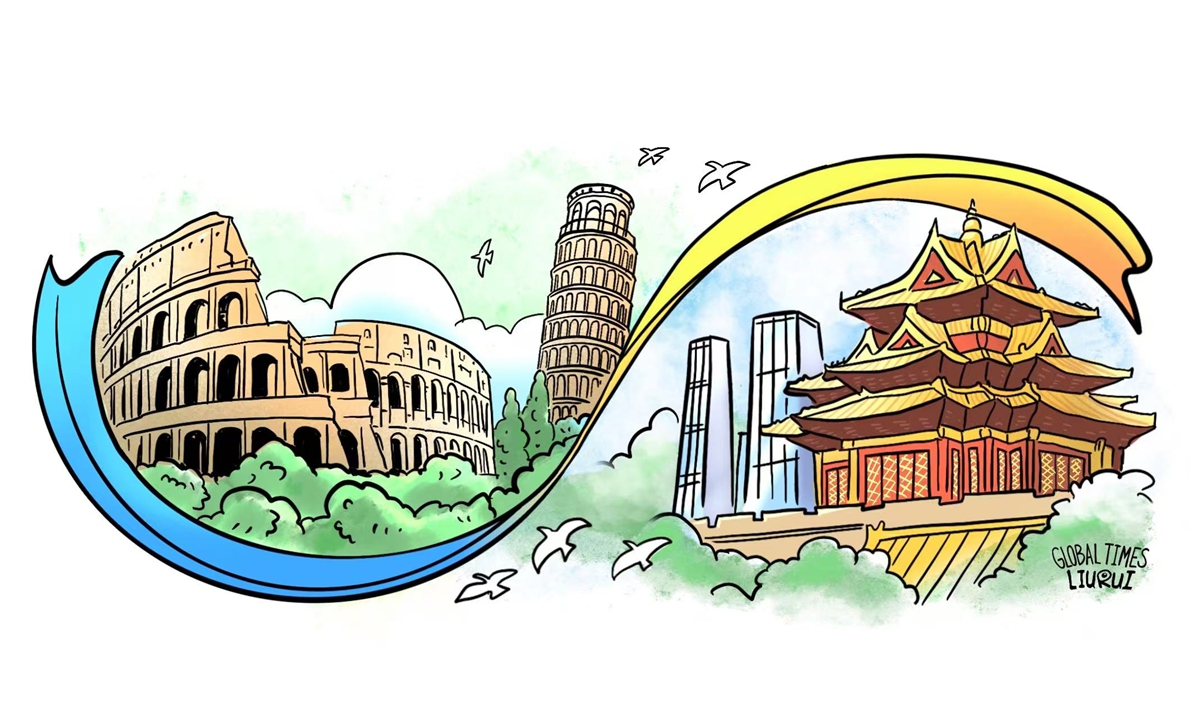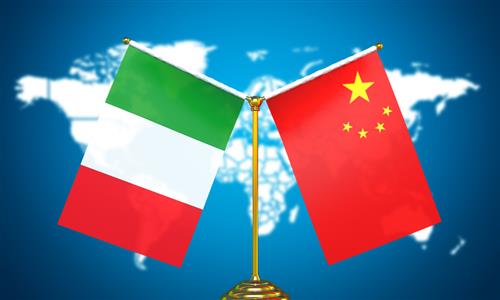
Illustration: Liu Rui/GT
As the third plenary session of the 20th Communist Party of China (CPC) Central Committee commits to "high-level opening-up," China seems dedicated to an impressive diplomatic effort of bridge building and dialogue: from Foreign Minister Wang Yi's meeting with US Secretary of State Antony Blinken in Laos, to the historical Beijing Declaration on Ending Division and Strengthening Palestinian National Unity by 14 Palestinian factions, or again Ukrainian Foreign Minister Dmytro Kuleba's pursuit of sustainable peace for Ukraine, to recall only a few engagements. The invitation of Chinese Premier Li Qiang to Italian Prime Minister Giorgia Meloni is yet another expression of this spirit of openness.On the Italian side, Meloni's trip took place at the beginning of a new phase. So far, Meloni's foreign policy has been marked by a relatively surprising entente with Ursula von der Leyen's European Commission, and a deep investment in US President Joe Biden. Yet with Biden bowing out, this investment could become a liability, as it is followed by a devalued dollar and trade tariffs. Within the EU, Meloni decided not to vote for Von der Leyen: partly due to pressure from within her coalition, partly for the difficulties in having her demands met as the new European Parliament is formed.
With the need to re-launch the relationship with China, the time was finally ripe for a trip to Beijing.
One year ago, I criticized the decision not to renew the BRI Memorandum of Understanding as a missed opportunity, and I will not cry over spilled milk. The detractors should at least explain to me why Brazil, the largest economy in South America, is currently contemplating joining, but I did not expect them to join then, nor do I expect them to join now.
Speaking of the present and future of China-Italy cooperation, the 2024-2027 action plan within the framework of the comprehensive strategic partnership is to be welcomed as a step forward, which is always better than a step back. Even some of the most hostile commentators have described China, and Italy's relationship with China, as "indispensable." A few extremists still denounce the three-year action plan as too much, but I interpret these as warnings for Meloni to watch her step. If Meloni had pushed the boundaries of what is "acceptable" for certain interest groups, I would expect more mediatic pressure, but anything is possible.
Among the commentaries, I have been struck to read that the leading Italian expert on the relationship with China such as professors Francesco Sisci and Michele Geraci have not been consulted in preparing such a delicate diplomatic step. Of course, the government has its distinct political angle, but there is no harm in hearing a few original voices.
Geraci, the leading Italian expert on the economic relationship with China, aptly described Meloni's balancing exercise as a "tightrope walk." Alternatively, one could speak of an obstacle course, with Meloni trying to navigate her own Silk Road around Washington, Brussels and possible competitors who instrumentally decry "the approach to China" while hoping to sign similar deals.
There is a point where my opinion aligns with experts interviewed by the Global Times. The external pressure pushed Italy out of the BRI and when the first Conte government collapsed less than six months after signing a memorandum of understanding (MoU) to advance the construction of the Belt and Road, it is my belief that foreign policy dynamics were not extraneous to those unclear circumstances.
Yet if some paths are tortuous, the Silk Road is straighter and broader. Chinese President Xi Jinping rightly elevated it beyond tactics and incidents, by recalling its historical and strategic dimension. Two thousand years ago, the Romans called the Chinese seres, a name that has to do with gold and silk, with prosperity and the benefit of mutual, peaceful exchanges. Centuries ago, Marco Polo and Matteo Ricci lived among the Chinese in reciprocal admiration and friendship.
As long as Italy retains its vitality and relevance on the world stage, it will also retain a deep and meaningful relationship with China.
The author is a foreign policy analyst for Italy and the EU. opinion@globaltimes.com.cn


